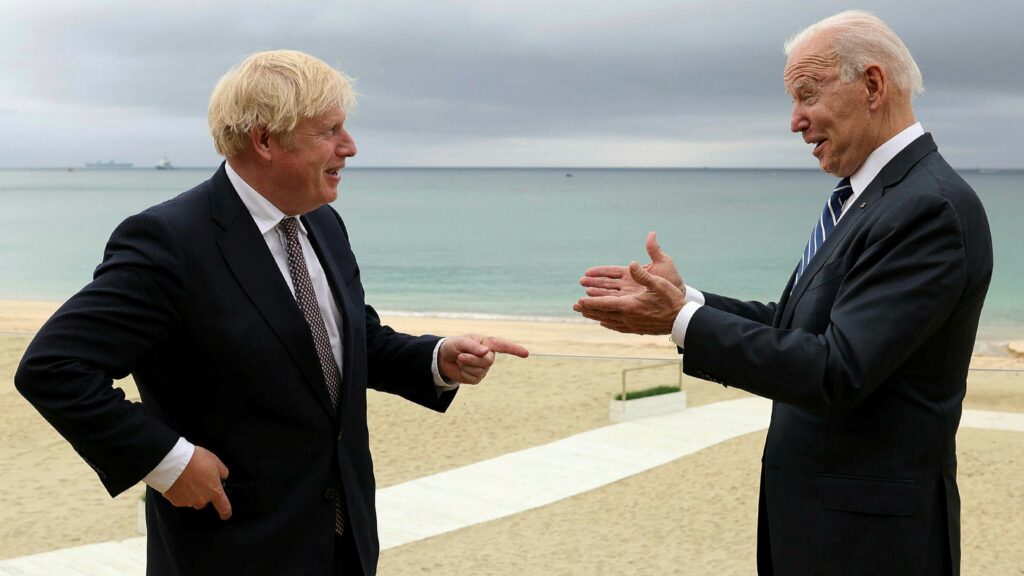
By Tommaso Rabitti, Third-year International Relations student at King’s College London and Editorialist at Res Publica
“What am I doing now?” These are the words President Biden muttered whilst looking around confused on the tarmac of Ben Gurion Airport upon his arrival in the Middle East – military aides and staff scurrying around him to show the way. Yet these words could equally be the epitaph to Boris Johnson’s premiership.
What to do next is not a simple question for the current US President and the soon-to-be former British Prime Minister. The oft-quoted ‘special relationship’ that bridges the Atlantic, or across the pond, if you will, is right now a special coincidence. Both leaders find themselves on shaky ground. Mr Biden is rapidly losing the support of many in his own party, with recent polls showing he has an approval rating of only 36% among Democrats, and 33% nationwide. Mr Johnson is on his way out, yet he is leaving behind a divided Conservative Party and a country at a loss for words after his personal excesses and the tower of scandals.
If we are to believe in the zeitgeist of the moment, it appears to be that voters want a return to decency. In both the US and the UK there is a feeling that governments are sliding away in extreme directions, whether that be political, personal or a combination of the two. It seems as if normalcy has come back in vogue as a central value.
In America, the Biden administration is centred around LGBTQ issues, gun control and the war in Ukraine – as opposed to soaring inflation, economic policy and a vision for the country – that has been drawing criticism from blue-collar Democrat voters and the Republican opposition. There is also scepticism about Mr Biden’s fitness for office: old age and a long string of gaffes. Crucially, Mr Biden’s popularity appears in free fall because of a partly unexpected left-wing turn on social issues; the term ‘culture wars’ naturally comes to mind. Mr Biden’s insistence on riding the identity politics dragon (which has now seemingly replaced the Democrat donkey as the new mainstream) is not reflected in terms of popularity on a wide scale. As Ruy Teixeira, the left-wing political scientist most famous for his often-accurate predictions, notes, Mr Biden “won the nomination being a moderate and then he tacked to the left, as opposed to going to the centre, which is unusual”. According to Mr Teixeira, Mr Biden is a prisoner of his party. A party that is becoming increasingly radical and elitist, losing large swathes of its traditional middle-class base.
Across the pond, Boris Johnson has the opposite problem. The Conservative party is a prisoner of Johnson’s legacy, but his policies were never as big of an issue. Rather, it was his character that caused discontent. The greatest takeaway from the recent leadership race is that all the candidates are emphasising the fact that they are not Boris Johnson, distancing themselves from his bombastic saga. Even Mr Johnson’s loyalists – until they were no longer loyal – such as Liz Truss and Rishi Sunak, are still trying hard to set themselves apart in their political persona and policy. It is as if, hearing the Tory leadership hopefuls, even Mr Johnson’s political successes had become tainted by his character.
The question then arises, like a beam of light cutting through the Anglo-American political stage: does this mark a return to political centrism?
Not exactly, I fear. The public outcry that brought down Mr Johnson and appears to be sinking Mr Biden is not a homogenous voice. Nor is it centrism that is being chanted. A majority of disillusioned Britons and Americans certainly want a return to decency and to more predictable politics. And less hyperbolic leaders. However, this sentiment of dissatisfaction is lacking both momentum and a clear alternative. Since 2016 British and American politics have been drunk on the ethereal populist cocktail. Now voters seek some predictability, and, maybe, less showbiz and more consistency.
The same question presents itself: what am I doing now? Only this time it’s up to Mr Sunak, Ms Truss and Ms Harris to answer.